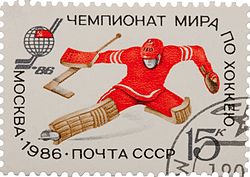1986 World Ice Hockey Championships

A Soviet stamp dedicated to the 1986 World Ice Hockey Championships
|
|
| Tournament details | |
|---|---|
| Host country |
|
| Dates | 12–28 April |
| Teams | 8 |
| Venue(s) | 2 (in 1 host city) |
| Final positions | |
| Champions |
|
| Runner-up |
|
| Third place |
|
| Fourth place |
|
| Tournament statistics | |
| Matches played | 40 |
| Goals scored | 296 (7.4 per match) |
| Attendance | 375,820 (9,396 per match) |
| Scoring leader(s) |
|
|
← 1985
1987 →
|
|
The 1986 Ice Hockey World Championships took place in the Soviet Union from 12 April to 28 April. The games were played at the Luzhniki Palace of Sports and the CSKA Ice Palace in Moscow, and eight teams took part. Each team played each other once, and then The four best teams then played each other once more with no results carrying over, and the other four teams played each other again to determine ranking and relegation. This was the 51st World Championships, and also the 62nd ice hockey European Championships. The reigning world champions from Czechoslovakia finished fifth, and the Soviet Union became World Champions for the twentieth time, and also won their 24th European Championship. In the European Championship, only mutual games between European teams in the first round were counted. For the disappointing Czechoslovaks, this was the first time since 1967 that they had finished out of the medals, and their worst result outside of the Olympics since 1937.
Attracting little notice at the time, Brett Hull made his debut in international hockey for the United States. It would appear that if Canadian coach Dave King had invited him to play in Moscow, the College student with dual citizenship, would have happily chosen a different path. Instead he chose to accept coach Dave Peterson's offer to compete for the Americans.
Poland, needing a win of four goals or more on the final day, tied, and were relegated
Played in Eindhoven March 20–29. The Swiss, narrowly failing to gain promotion in last year's tournament, made no mistake this year, losing only in a final meaningless game against East Germany. On the last day of competition, four different nations were in danger of relegation, with a myriad of tie breaking scenarios.
Depending on the results of the final day, two of Austria, Japan, the Netherlands, and Yugoslavia would be relegated. In the first game Yugoslavia played Japan with the loser being relegated. A five to zero score relegated Japan. In the next game, Italy beat France, assuring the Austrians of safety from relegation. The Dutch had their fate in their own hands in the last game, a win and they would remain, a loss and they would be relegated. The unfortunate Yugoslavian team had to watch all day and hope, a hope dashed by a Dutch three to two win over Austria.
...
Wikipedia
